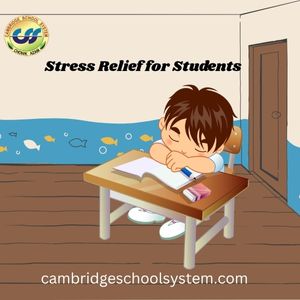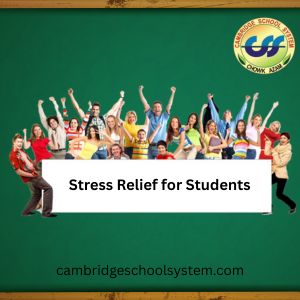Stress Relief for Students
Student life is replete with academic burdens close deadlines and social pressures that can result in debilitating stress. Finding efficient stress relief is imperative not only for mental health, but also for keeping oneself focused productive and overall successful in studies. The good news is that with proper techniques students can deal with stress in a very effective way and even utilize it as a spur to perform even better. From mindfulness techniques to physical exercises and effective time management there are many ways to gain freedom from the persistent pressures of student life.
Mindfulness meditation is one of the easiest ways of relieving stress which quietens the mind and enhances concentration. Just a few minutes of deep breathing or guided meditation can significantly reduce anxiety levels. Physical activity whether through sports yoga or even a brisk walk releases endorphins natural mood boosters that counteract stress. Additionally maintaining a balanced diet and getting adequate sleep are foundational to managing stress as poor nutrition and sleep deprivation can worsen anxiety and reduce cognitive function.
Time management is also a key component in stress reduction. Dividing tasks into smaller more manageable pieces and employing aids such as planners or computer programs can avoid cramming at the last moment and feelings of being overwhelmed. Social support is also important. Conversations with friends study groups or counseling can bring emotional comfort and a feeling of belonging.
Finally stress management for students is about building lasting habits that foster balance and resilience. Through the implementation of these techniques in daily life students are better able to cope with the demands of coursework and lead a healthier more enriching college life. Consistency is the magic word small habitual interventions in self care translate to long term gains in mental and academic function.

Preparation Mindfulness and Meditation for Stress Relief
Mindfulness and meditation are highly effective in relieving student stress by soothing the mind and enhancing emotional regulation. Studies indicate that habitual meditation can curtail anxiety by reducing cortisol levels the major stress hormone of the body. It may be initiated with as little as 5-10 minutes a day with guided apps like Headspace or Insight Timer for starters.
Methods like concentrated breathing (inhaling for 4 seconds, holding for 7, exhaling for 8) give relief right away during stressful situations like exam time. Mindfulness is not necessary in silence even mindful walking or eating can ground you in the present moment dissolving whirling thoughts. Research shows that students who practice mindfulness concentrate better and experience fewer negative states.
These exercises rewire the brain over time to respond to stress more successfully so they are a long term instrument for stress relief. Most universities provide free workshops on meditation and YouTube has hundreds of free guided sessions. Through committing a few minutes each day to mindfulness students can become resilient to academic stress while having better sleep and mental clarity overall.
Exercise Recurrently to Boost Mood and Energy
Daily exercise is one of the most powerful antidotes to stress and a great mood and energy booster. As you move your body it releases endorphins natural compounds that function as pain relievers and mood lifters giving you an instant sense of relief from tension and anxiety. A fast 30m minute walk, yoga, or high intensity exercise movement serves to clear your head and decrease the excretion of stress hormones such as cortisol.
Research indicates that students who add exercise to their lifestyle enjoy heightened concentration improved sleep and better cognitive function all leading to academic achievement. Exercise also boosts circulation to the brain enhancing mental acuity and creativity. For people with hectic schedules even brief periods of movement such as taking the stairs stretching between study periods or dancing to a song can provide release and replenish the body.
Most campuses offer free exercise classes, access to gyms, or outdoor facilities to exercise in, so getting active is simple. If regular exercise becomes a routine students can become less susceptible to stress and ultimately be healthier overall. The catch is to do something you like so it becomes a habit and not a chore. Prioritizing movement not only enhances physical health but also provides a powerful natural way to maintain emotional balance and energy through the school year.

Maintain a Healthy Diet for Mental Clearness
Nutrition plays a critical role in stress relief as poor eating habits can exacerbate anxiety and fatigue. Complex carbohydrates such as oats and sweet potatoes increase serotonin inducing relaxation. On the other hand too much caffeine and sugar lead to energy crashes increasing stress. Meal preparation guarantees that healthy choices can be had during hectic weeks avoiding the temptation of fast food.
Hydration is also crucial, as dehydration reduces concentration so try for 2-3 liters of water per day. Herbal teas such as chamomile or peppermint provide calming release, particularly before sleep. For healthy, fast snacks, combine Greek yogurt with fruit or hummus with vegetables to provide long lasting energy.
Many colleges have nutritionists who can advise on healthy affordable eating. Properly fueling the body helps students think more clearly feel emotionally balanced, and resist stress. Minor dietary adjustments can result in tremendous relief and meals become an instrument for both physical and mental health.
Get Enough Sleep for Improved Stress Management
Lack of sleep takes a tremendous toll on stress relief by increasing emotional reactivity and interfering with memory consolidation both essential to success in school. Students need to make 7-9 hours each night a priority, with regular consistent sleep even on weekends. A calming pre-sleep routine tells the brain it’s time to relax no screens blue light messes with melatonin reading or light stretching instead, and a cool dark bedroom.
If racing thoughts get in the way of sleep experiment with journaling or white noise. Power naps (20-30 minutes) allow release without drowsiness but not napping close to evening. Sleep apps such as Sleep Cycle monitor patterns and caffeine curfews none after 2 PM to avoid disruption. Repeated sleep loss is associated with elevated cortisol levels which makes stress more difficult to cope with.
Well rested students learn more effectively problem solve problems better and stay more emotionally balanced. Prioritize sleep as non negotiable self care it’s the anchor for all other stress relief measures. Campuses typically provide sleep workshops or resources to utilize them to maximize rest and performance.
Stay Organized to Mitigate Academic Pressure
Disorganization and lack of time management skills intensify stress so organization is a major relief measure. Digital tools such as Google Calendar, Trello or Notion facilitate monitoring of assignments, exams, and deadlines. Divide big projects into minimal tasks with the SMART goal model to prevent panic at the last minute.
The Pomodoro Technique 25- minute intense work sprints followed by 5-minute breaks increase efficiency without leading to burnout. Identify interruption free study areas to maximize focus. Weekly checks on evolvement and the modification of timetables guarantee nothing slips over. Physical tidiness counts too a clean and organized workspace decreases mental clutter.
Most universities provide workshops or peer tutoring on time management. Staying on top of the organization gives students mastery over workload with resulting in regular stress release. An organized environment and explicit plan prevent overwhelm allowing mental energy to be deployed for creativity and relaxation.

Socialize with Friends and Ask for Help
Social interaction is an established stress reducer as loneliness exaggerates anxiety. Hanging out with friends on a regular basis studying eating, or engaging in hobbies together encourages emotional comfort. Laughing and shared activities release oxytocin which blocks out stress chemicals. Attend clubs or campus organizations to connect with similar students even minor interactions increase mood.
For more serious issues the majority of colleges have free counseling available taking advantage of them is a source of strength not weakness. Peer support groups validate stress and provide coping mechanisms. When in being contact is not feasible online check in sustain connections. Pets can be companions too. Some campuses have therapy dog plans. Vulnerability makes relationships stronger sharing loads makes them lighter.
By valuing connection, students create a safety net that makes adversity wieldy. Humans are hardwired for community and relying on others is one of the most potent methods for maintaining relief in challenging academic endeavors.
Conclusion
Discovering the right stress relief for students is key to staying mentally healthy and academically successful. The difficulties of exams coursework and social activities can be overwhelming but with the right tools release is within reach. By adding mindfulness reliable exercise balanced diet quality sleep proper organization and social support to your daily routine, you can greatly alleviate stress. These methods not only offer quick relief but also help to develop long term resistance against future stressors.
Remember stress release doesn’t have to be time intense or complicated. Even small changes like a short meditation session, a healthy snack or a quick walk can make a big change. The key is constancy and finding what workings best for you. If stress feels unmanageable don’t hesitate to seek help from counselors friends or campus resources. You’re not alone, and support is always available.
Ultimately prioritizing relief from stress leads to better focus higher energy and a more enjoyable student experience.

